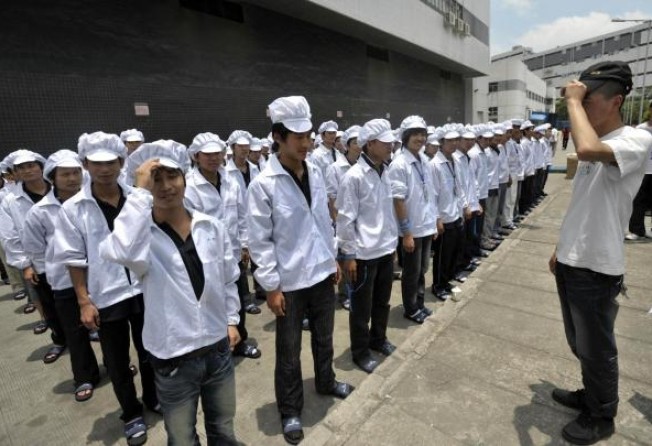Mainland factories ready to explode
Growth threatened by with restive male workforce and a thick, low glass ceiling

How can it be that a company clever enough to satisfy Apple's famously stringent requirements can't figure out how to keep its workers from killing themselves and hurting one another?
The recent riot at a Foxconn Technology Group factory in northern China belies the myth that better pay and benefits are enough to mollify Chinese workers. Foxconn, which is Apple's leading supplier, already pays above-market rates and has been raising wages.
A sea change is rippling through many Chinese factories. A workforce once dominated by women is now increasingly male. China's one-child policy chips away daily at its competitive advantage in manufacturing for export, first by choking the supply of labour of both sexes, then by restricting the flow of women into factory jobs. The result is a more restive male workforce, frustrated by crude management and a thick, low glass ceiling.
When I first started visiting Chinese clothing and electronics factories a decade ago, there were often more women than men on the assembly line. Like the industrial bosses of 18th-century England, factory managers chose women for their docility, dexterity and attention to detail.
Today, many plants have no choice but to hire more men than women. China's gender ratio - 107 boys born for every 100 girls in 1980 - has widened to 118 boys born for every 100 girls as of 2010.
Sex-selective abortion is creating kindergartens of boys and villages of bachelors.
Chinese parents, wealthier today than a decade ago and wiser about the risks of sending a teenage girl alone across the country to work, are less inclined to steer their children into factory jobs. I have met young Chinese women in countryside towns - where a decade ago most girls would have done at least one turn in a coastal factory - who say that "our generation doesn't work in factories".
Many workers I have met describe "personal development" - starting a business, learning a trade - as a goal. Yet few, if any, factories try to help them achieve that. The truculence of the global supply chain is partly to blame, wooing workers with high wages ahead of product launches and expecting them to accept big pay cuts or long holidays when production schedules ease.
Factory managers are also part of the problem. Too many treat staff as expendable, favour friends and neighbours from home, and fail to offer workers a path for advancement.
China's male malaise has only just begun. Although the gender imbalance appears to be easing, it is too late to arrest China's ballooning demographic debt. Even if China cancelled the one-child policy today, economic development will persuade mainland Chinese to keep their families small. Rising living and education costs have led couples in these areas to postpone marriage and to have fewer children.
In China, companies and the government aren't doing enough to help lower-income workers develop on the assembly line or get promoted. Until officials in Beijing and companies such as Foxconn understand this, workers are only going to get more frustrated, threatening the nation's economic development and the social stability on which its new leaders will depend.
Bloomberg